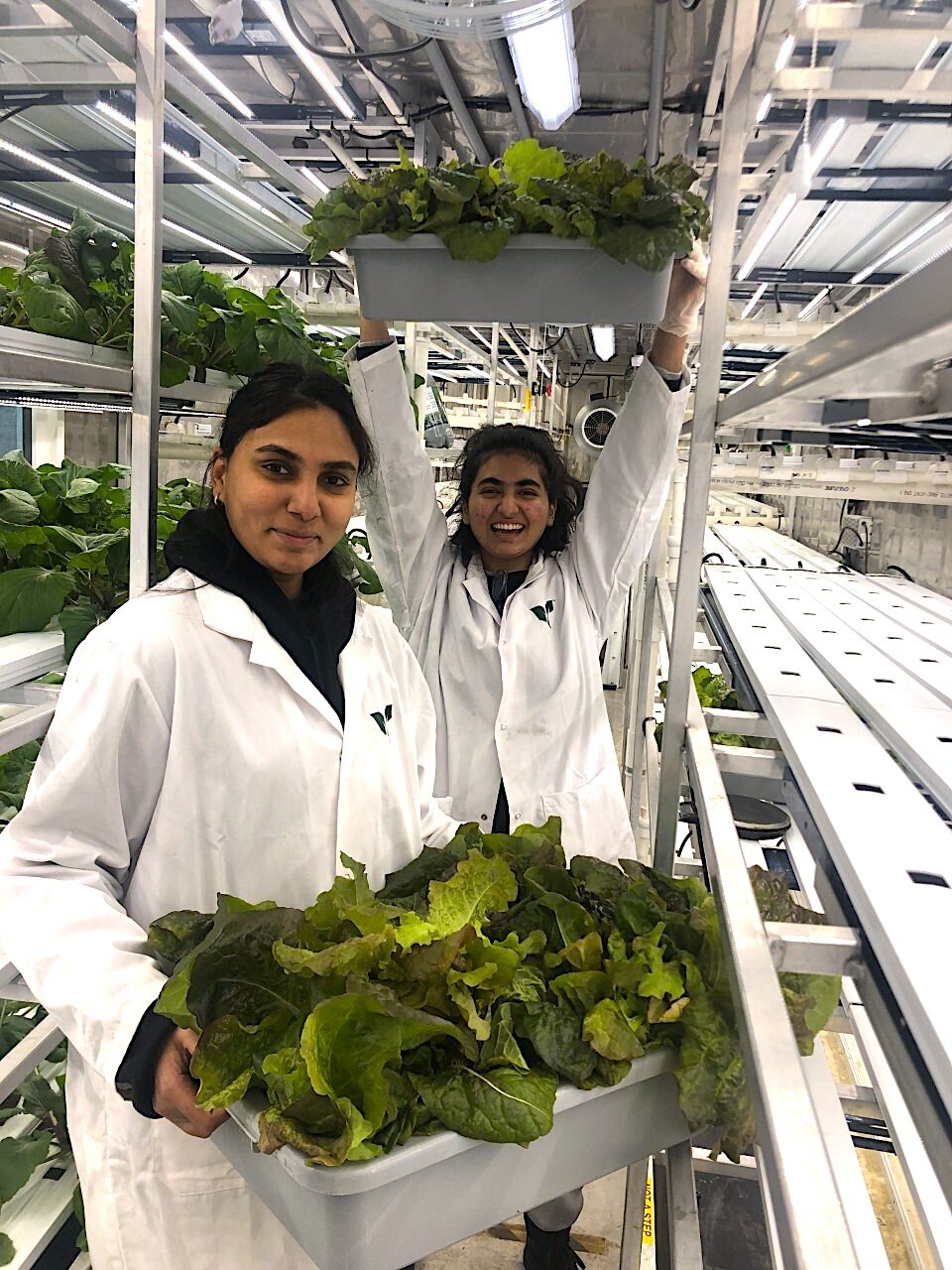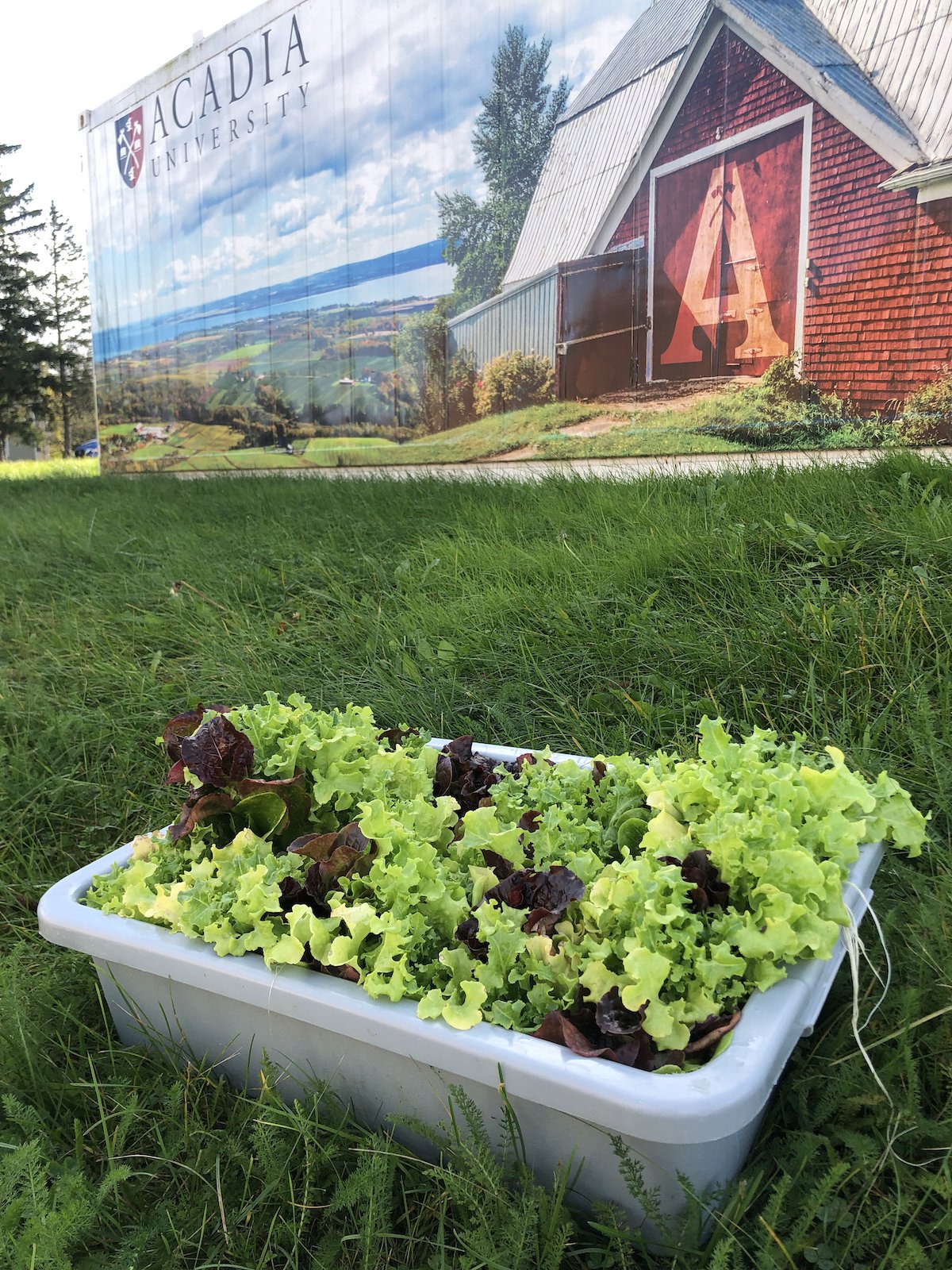Q&A With A Head Grower
Go behind the scenes with Madalyn Higgins, the head grower at Acadia University!
Acadia University is the first post-secondary institution in Atlantic Canada to bring one of the Growcer’s hydroponic farms onto their campus.
The university saw the opportunity to increase its commitment to campus sustainability and support its ambitious new food services plan. In addition to providing a reliable supply of safe produce for the campus, the university also creates a unique hands-on learning environment for students and donates 10% of produce to the student union food cupboard.
One of Madalyn’s highlights is being able to provide fresh greens to our students who may not otherwise be able to afford fresh vegetables through the Student Union Food Cupboard.

Madalyn and her two student helpers, Steena and Piram, who keep the Growcer farm growing!

As head grower, Madalyn gets help from two students, Steena and Piram, on big harvest days. It gives her an extra hand while providing a unique learning opportunity for sustainability students.
What’s your role and what does a typical day as head grower look like for you?
My role with the Growcer is a unique one! As I am also a Dietitian and Sustainability Manager, the Growcer farm is only about a third of my responsibilities which keeps me busy.
On a typical Growcer farm day, I usually start by checking my emails and making sure that all of my students are doing well before I head to the Growcer. Whenever I can, I bring in my two amazing students to help me complete the daily tasks as I couldn’t do it all without them.
Most days I start early in the morning and complete the daily checks (pH, EC, water levels, etc.) and then when my students arrive, we assess what needs to get done and set a plan for the day. If there is a harvest to do, we communicate with the campus chefs and bring stuff in for them to use. If it is a cleaning day, we put on our equipment, play some music, and get to cleaning!
What’s a common misconception about the work you do?
I would say the biggest misconception is the amount of time it takes to harvest, clean, and take care of the hydroponics.
Having also worked on a farm I know very well the amount of time, effort, and care that goes into growing food and hydroponics is no different.
Although the Growcer takes away a lot of the troublesome elements of traditional farming such as weather, growing your own food still takes time but is well worth the effort! I think everyone should have the opportunity to work on a farm (or Growcer!) to become more connected with their food and learn how much work it truly takes to feed our world.
“Everyone should have the opportunity to work on a farm (or Growcer!) to become more connected with their food and learn how much work it truly takes to feed our world. ”

At least 10% of every harvest is donated to the Acadia Student Union Food Cupboard to provide fresh greens to students in need.
You have a background as a dietitian and in sustainability, what role do you see vertical farming playing in our food system?
With food prices soaring and climate change showing no signs of stopping, I think that we are going to continue to need innovative ways to feed our growing world such as vertical farming. I am hopeful we can find a way to continue growing and feeding our population from the land and use vertical farming as a way to fill the gaps.
In my current role, I have been collaborating with the incredible team at our campus food cupboard to provide fresh greens to our students who may not otherwise be able to afford fresh vegetables.
What’s the most rewarding part about vertical farming?
Firstly, one of the most rewarding parts of the job is working with my students and seeing their success with the harvests. I was still learning about the Growcer when they joined, and it was amazing to see how fast they learned.
Secondly for me would be getting to provide all of the students with local, fresh greens. Especially the Food Cupboard but also the students on campus.
What’s one aspect of vertical farming you would like to see improve in the future?
I’d love to see more ways to utilize renewable energy on the farms! I would love to see solar panels become more common on vertical farms.

Meet the grower: Madalyn Higgins
Madalyn Higgins is a Registered Dietitian from Nova Scotia. She currently works as a Dietitian and Manager of Sustainability with Acadia Dining and is the lead grower for their onsite hydroponic unit. She loves food and is very passionate about sustainability making working with the Growcer a perfect fit!

